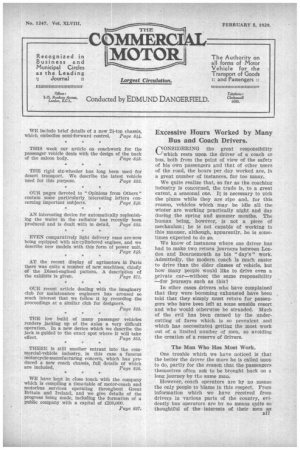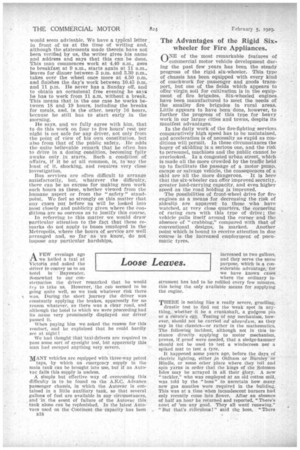Excessive Hours Worked by Many Bus and Coach Drivers.
Page 1

Page 2

If you've noticed an error in this article please click here to report it so we can fix it.
ONSIDERING the great responsibility which rests upon the driver of a coach or bus, both from the point of view of the safety of his own passengers and that of other users of the road, the hours per day worked are, in a great number of instances, far too many.
We quite realize that, so far as the coaching industry is concerned, the trade is, to a great extent, a seasonal one. It is necessary to pick the plums while they are ripe and, for this reason, vehicles which may be idle all the winter are working practically night and day during the spring and summer months. The human being, however, is not a piece of mechanism ; he is not capable of working in this manner, although, apparently, he is sometimes expected to do so.
We know of instances where one driver has had to make two return journeys between London and Bournemouth as his " day's " work. Admittedly, the modern coach is much easier to drive than the older classes of vehicle, but how many people would like to drive even a private car—without the same responsibility —for journeys such as this?
In other cases drivers .who have complained that they were becoming exhausted have been told that they simply must return for passengers who have been left at some seaside resort and who would otherwise be stranded. Much of the evil has been Caused by the undercutting of fares which is so prevalent and which has necessitated getting the most work out of a limited number of men, so avoiding the creation of a reserve of drivers.
The Man Who Has Most Work.
One trouble which we have noticed is that the better the driver the more he is called upon to do, partly for the reason that the passengers themselves often ask to be brought back on a long journey by the same man.
However, coach operators are by no means the only people to blame in this respect. From information which we have received from drivers in various parts of the country, evidently bus operators are by no means quite so thoughtful of the interests of their men as would seem advisable. We have a typical letter in front of us at the time of writing and, although the statements made therein have not been verified by us, the writer gives his name and address and says that this can be done. This man commences work at 4.40 a.m., goes to breakfast at 9 a.m., starts again at 11 a.m., leaves for dinner between 3 p.m. and 3.30 p.m., takes over the wheel once more at 4.50 p.m. and finishes the day's work between 10.45 fi.m. and 11 p.m. He never has a Sunday off, and to obtain an occasional free evening he says he has to work from 11. a.m. without a break. This means that in the one case he works between 18 and 19 hours, Including the breaks for meals, and, in the other, nearly 16 hours. :because he still has to start early in the morning.
He says, and we fully agree with him, that to do this work on four to five hours' rest per night is not safe • for any driver, not only from the point of view of his own constitution. but also from that of the public safety. lie adds the quite believable remark that he often has to drive in a dozing condition, becoming fully awakeonly in starts. Such a condition of affairs, if it be at all common, is, to say the least of it. shocking, and requires very close investigation.
Bus services are often difficult to arrange satisfactorily, but, whatever the difficulty, there can be no excuse for making men work such hours as these, whether viewed from the humane aspect or from the " safety" standpoint. We feel so strongly on this matter that any cases put before us will be looked into most closely and publicity given where the 'Conditions are so onerous as to justify this course.
In referring to this matter we would draw particular attention to the fact that these remarks do not apply to buses employed in the Metropolis, where the hours of service are well arranged and, so far as we know, do not impose any particular hardships. The Advantages of the Rigid Sixwheeler for Fire Appliances.
(NE of the most remarkable features of ‘—"commercial motor vehicle development dur ing the past few years has been the steady progress of the rigid six-wheeler. This type of chassis has been equipped with every kind of coachwork for passenger and goods transport, but one of the fields which appears to offer virgin soil for cultivation is in the equipment of fire brigades. Six-wheeled engines. have been manufactured to meet the needs of the smaller fire brigades in rural areas. Little appears to have been done, however, to further the progress of this type for heavy work in our larger cities and towns, despite its manifest advantages.
In the daily work of the fire-fighting services comparatively high speed has to be maintained, and acceleration is of necessity as rapid as conditions will. permit. In these circumstances the bogey of skidding is a serious one, and the risk to personnel, machines and the public cannot be overlooked. In a congested urban street, which is made all the more crowded by the traffic held up to facilitate the passage of a motor pump, escape or salvage vehicle, the consequences of a skid are all the more dangerous. It la here that the six-wheeler can offer improved security, greater load-carrying capacity, and even higher speed as the road holding is improved.
• The possibilities of front-wheel drive for fire engines as a means for decreasing the risk of sideslip are apparent to those who have watched, at very close quarters, the cornering of racing cars with this type of drive; the vehicle pulls itself around the corner and the absence of "crabbing," compared with that of _conventional designs, is marked. Another point which is bound to receive attention in due course is the increased employment of pneumatic tyres.


































